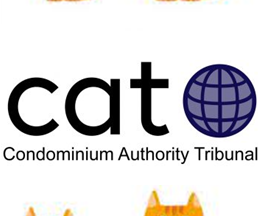 June 2023
June 2023
The Condominium Authority of Ontario is celebrating its fifth year of operation. In this five-part series, Toronto Condo News looks at how CAO and the Condominium Authority Tribunal have impacted on condominium living and management, and present an inside-view of what it is like to appear before the Tribunal.
February 2022 – Fairness and Justice in Condominium Communities
March 2022 – What they Don’t Want you to Know – Lurking behind their closed door
April 2022 – Making a Successful CAT Submission
May 2022 – Calling for the Expansion of CAT
June 2022 – Condo Disputes without CAT
You wake up in the middle of the night to someone working in their backyard, a neighbour playing music too loud, or late-night and noisy parties.

Disputes between neighbours are difficult regardless of where or how you live. Those who live in single-family housing have little recourse when a neighbour is noisy, disruptive or dangerous. Imagine what high-rise condominium living would be like if everyone did what they want, when they want and failed to consider the impact on neighbours. Peaceful and enjoyable high-rise condominium living would never work. Anarchy would reign in our homes and shared spaces.
Everyone fights with their neighbours. It is not unique to condos. The difference is that condo residents have something they can do about it other than taking someone to court or complaining on Facebook.
One of the responsibilities of condominium management is to deal with these disputes. Condominium communities have rules residents are expected to follow. When management is unwilling or incapable of addressing disputes, establishing reasonable rules or enforcing them, there is the Condominium Authority Tribunal (CAT).
CAT has earned respect from condominium owners by providing a way to address disputes outside the court system
Disputes between neighbours are now fought at the CAT. Since 2017, they have been the final decider on disputes within their jurisdiction rather than the courts. Their jurisdiction has been growing.
Condo boards and the CAT have become governance authorities that impact on more than two million people in Toronto and the GTA. When disagreements arise in a condominium community, CAT provides somewhere to resolve them without resorting to violence or the court system. CAT rulings are published and available on the internet providing unwanted publicity to individuals and communities failing to act reasonably, and hopefully curtailing their actions.
A December 2022 report from Ontario’s Auditor General, a follow-up to a 2020 report on condo oversight, notes that CAT had expanded beyond administrative matters to now include a range of disputes including pets, parking, balcony furniture, odours and noise. The report notes that their authority may expand to eventually cover all condo-related disputes.
When there is a dispute between an owner and the condominium corporation, it is more difficult for condo owners to afford lawyers whereas condo boards have access to owner funds. CAT leveled the field by establishing a system that doesn’t require a lawyer and costs no more than $200. While condominium boards are still more likely to employ a lawyer, CAT rarely compensates them for this, placing the corporation at greater risk of financial loss.
The process can be slow with CAT taking an average of six and a half months to resolve disputes. This is faster than the former option of going to court at a much greater cost. Landlord and Tenant Board hearings, by way of comparison, can take ten months or longer assuming no delays or extension.
CAT has earned respect from condominium owners by providing a way to address disputes outside the court system.







